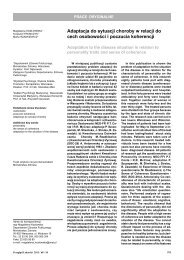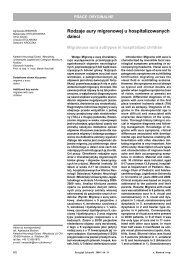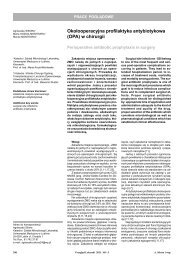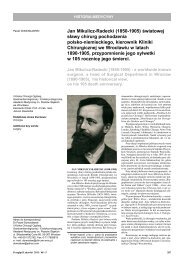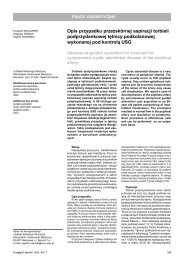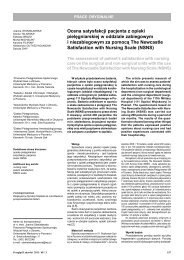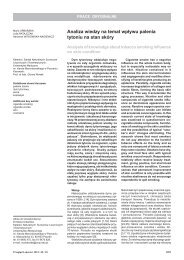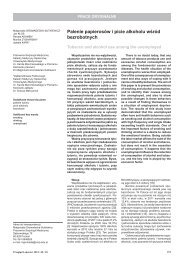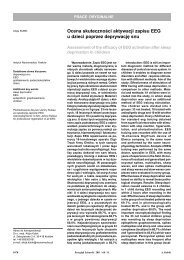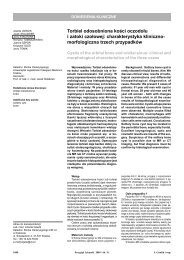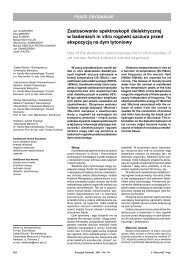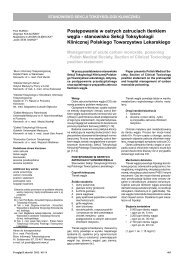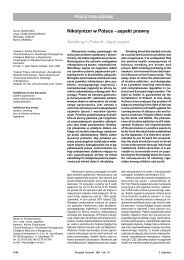Wzorzec-przegl d lekarski-XX-2001
Wzorzec-przegl d lekarski-XX-2001
Wzorzec-przegl d lekarski-XX-2001
You also want an ePaper? Increase the reach of your titles
YUMPU automatically turns print PDFs into web optimized ePapers that Google loves.
Table II<br />
Proportion reporting poor sleep on 4 or more nights a week by smoking, worries and health variables by<br />
gender, age 16-74<br />
Men Women Total<br />
% n= % n= % n=<br />
Cigarette Smoking<br />
Current Smoker 19.0 1162 24.4 1402 22.0 2564<br />
Ex Smoker 12.0 1808 18.3 1938 15.3 3746<br />
Never Smoked 12.3 877 16.8 1383 15.0 2260<br />
p= 0.000 0.000 0.000<br />
Self-reported Worries<br />
No 9.3 2612 12.5 2888 11.0 5500<br />
Medium 14.6 591 22.2 825 19.0 1416<br />
High 33.6 648 38.4 1014 36.5 1662<br />
p= 0.000 0.000 0.000<br />
Health worries<br />
No 10.0 3228 15.3 3909 12.9 7137<br />
Medium 28.4 342 33.7 466 31.4 808<br />
High 45.6 281 49.7 352 47.9 633<br />
p= 0.000 0.000 0.000<br />
Self-reported Health<br />
Very Good or Excellent 7.0 2111 12.3 2473 9.8 4584<br />
Good 13.4 972 20.4 1253 17.3 2225<br />
Fair or poor 35.1 767 37.4 999 36.4 1766<br />
p= 0.000 0.000 0.000<br />
Number of chronic illnesses<br />
0 8.3 2108 12.7 2442 10.7 4550<br />
1 16.7 1099 21.4 1296 19.2 2395<br />
2 22.0 381 28.7 575 26.0 956<br />
3 or more 40.0 260 44.0 411 42.5 671<br />
p= 0.000 0.000 0.000<br />
Source: Psychiatric Morbidity Survey, 2000 (authors' analysis)<br />
Worries are implicated in the gender difference<br />
in sleep problems. Women's sleep<br />
is more likely to be disturbed by worries,<br />
particularly associated with their gender role<br />
as mothers or wives, and their concern for<br />
the well-being of family members [13, 2, 31].<br />
Previous sleep research has tended to view<br />
'worries' as a mark of anxiety or psychological<br />
problems, rather than embedded within<br />
social roles and responsibilities. Worries<br />
and concerns represent an important predictor<br />
of sleep problems, but retain an independent<br />
effect after controlling for health and<br />
depression Table III, Model 5). In addition,<br />
this analysis suggests that differences in<br />
health status between men and women do<br />
not explain the gender difference in sleep<br />
problems. Indeed, the gender difference<br />
becomes greater after adjusting for health<br />
variables and depression (Table III, Model 5).<br />
This research supports other studies<br />
that have found poorer sleep quality among<br />
those with low educational qualifications [15,<br />
21, 24, 29], who are not working [22, 24],<br />
and have low income [17, 9]. However, this<br />
study goes beyond previous research in two<br />
ways. First, by using representative national<br />
data to simultaneously consider the independent<br />
effects of four SES variables (education,<br />
employment status, household income,<br />
housing tenure). Second, it addresses previous<br />
observations [24] that the higher prevalence<br />
of insomnia among individuals with low<br />
education, not working and with low income<br />
may be confounded by poor physical and<br />
mental health, through examining models<br />
containing health measures and depression.<br />
The relative importance of different sets<br />
of factors in leading to sleep problems are<br />
considered. 'Worries' are likely to be confounded<br />
with socio-economic characteristics;<br />
the relationships between sleep problems<br />
and living on a low income or living in rented<br />
housing were partially mediated through<br />
worries and concerns. After adjusting for<br />
smoking, worries, health and depression, a<br />
significant independent association still remained<br />
between sleep problems and both<br />
low education and not being in paid work.<br />
Lack of employment is linked to sleep problems<br />
in two ways; for the unemployed, primarily<br />
through its intrinsic relationship with<br />
worries, while for the economically inactive,<br />
primarily because of their poorer health status.<br />
There is a much larger effect of marital<br />
status on sleep problems among men than<br />
among women, suggesting advantages<br />
conferred by marriage for men in terms of<br />
sleep quality. Divorced/separated men and<br />
widowed men have particularly poor quality<br />
sleep compared with married men. Although<br />
losing a partner (whether through<br />
divorce or death) has psychological consequences<br />
which may adversely effect sleep<br />
quality, this analysis shows that a major factor<br />
explaining the higher rate of sleep problems<br />
among the previously married is their<br />
more disadvantaged SES.<br />
Conclusions<br />
A large part of the well-known gender<br />
difference in reported sleep problems is<br />
mediated by the more disadvantaged socioeconomic<br />
status (SES) of women, casting<br />
doubt on the primacy of physiological explanations<br />
of this gender difference. In turn,<br />
SES is shown to impact on psychological<br />
distress and worries, which form part of the<br />
mechanism through which disadvantaged<br />
SES impacts on sleep problems.<br />
There are gender differences in the association<br />
of marital status with poor sleep<br />
with greater effects of marital status for men<br />
than women. Men who were previously married<br />
(whether divorced or widowers) have<br />
particularly poor sleep compared with their<br />
married counterparts. Whereas for women,<br />
these associations with marital status are<br />
less strong. However, among both men<br />
and women, a substantial proportion of the<br />
higher reported sleep problems of the divorced<br />
and widowed can be accounted for<br />
by their more disadvantaged SES. These<br />
findings that people with more disadvantaged<br />
SES report greater sleep problems<br />
need further consideration by health researchers.<br />
Despite sleep being important for health<br />
and well-being [3], previous research on<br />
gender inequalities in health has hitherto<br />
paid scant attention to gender differences<br />
in sleep problems or to how women's disadvantaged<br />
social position or gender roles<br />
mediate these differences. This research<br />
has shown strong linkages both between<br />
socio-economic variables and reported<br />
sleep problems, and between health variables<br />
and sleep problems. This suggests<br />
that low socio-economic status, family worries<br />
and women's family roles, may potentially<br />
be mechanisms that account for<br />
women's greater experience of sleep disruption.<br />
Acknowledgements<br />
The author acknowledges funding from<br />
the New Dynamics of Ageing initiative, a<br />
multidisciplinary research programme sup-<br />
58 Przegl¹d Lekarski 2012 / 69 / 2 S. Arber



